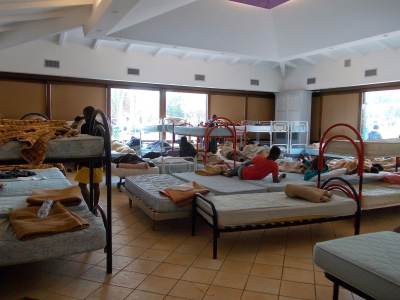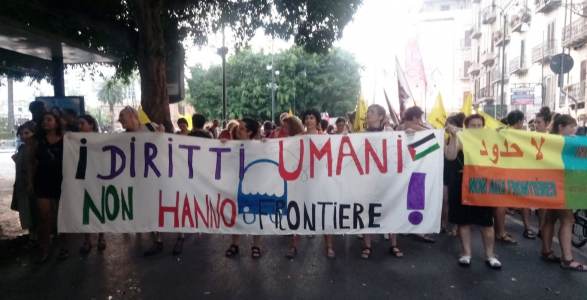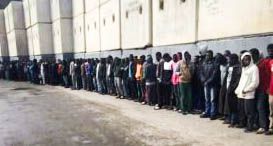Living conditions in the center of Villa Sikania and the insufficient access to basic rights. An accusation of ASGI* and Borderline Sicilia
Generally, persons landing on Lampedusa will, after their time – and the usual informal detention – in the local hotspot, be transferred to the extraordinary reception center ‚Villa Sikania‘ of Siculiana in the province of Agrigento. The staff of ASGI* of the ‚In Limine‘ project and of the association Borderline Sicilia have been monitoring the access to procedures for requesting international protection for a while as well as the observance of the basic rights of foreign citizens staying in the center.
In the course of multiple visits numerous asylum seekers were interviewed, among others families and single parents but especially single women with underage children. Generally and at various instances, grave shortcomings regarding the communication of information as to the juridical situation of said foreign citizens were ascertained. According to the persons in question, weeks, sometimes even months pass without them receiving information concerning their asylum proceedings and their residence status in Italy. Moreover, several applicants are supposed to have waited more than a month to be able to formalize their asylum application, not at all in accordance with current legislation that requires formalization within three or at maximum ten days after the initial application [1].
Such delays create an uncertain situation in which access to the rights connected with residence permits is strongly impeded. In point of fact, asylum seekers, to give just one example, are supposed are within sixty days of formalizing the asylum plea to be guaranteed the possibility of professional activity, i.e. work, to receive access to complete health protection with the help of the obligatory registration at the local department of health, to be allocated a family doctor and have the possibility of visiting specialist doctors and receive diagnoses.
To protect foreign fellow citizens from the consequences of these delays, numerous inquiries in the name of the persons concerned have been sent to police headquarters in Agrigento, so that they should as soon as possible be granted access to formalization of the international asylum plea and be able to exercise their rights, as provided by the regulation for asylum seekers.
Furthermore, from collected witness reports emerges a worrying picture of material and sanitary conditions as well as – for this kind of center – a lack of basic facilities which do not meet basic needs and do not seem to be able to ensure the preservation of human dignity. In general, as follows from the collected witness reports, there seems to be a lack of offers for care in the case of special needs [2].
Especially worrying are the inadequate sanitary facilities, the overcrowding of rooms as well as the lack of respect regarding private and family life. As is being related, men seem to be sleeping in dormitories of 25 persons while women with children are placed in rooms for six women and four children, apparently equipped with only one bathroom. There does not seem to be special assistance for newborns who, depending on the status of their parents, have to manage for months without access to appropriate medical care. Reportedly, there aren’t any cradles or cribs, so that children have to sleep together with their mothers.
The beds are supposed to be full of bugs and there does not seem to be a sufficient number of bedding and blankets available.
The case of the center ‚Villa Sikania‘ in Siculiana seems to be exemplary for the complete inappropriateness characterizing the current reception system. It does not seem to provide sufficient guarantee and protection for the persons seeking international asylum. Residency in this center is to that effect accompanied by the violation of the rights of foreign citizens who, from the moment of their rescue and contrary to what should actually be the case, are thrown into an obstacle course towards recognition of their rights; ranging from the detainment of ships at sea to the illegitimately long stay in the hotspot of Lampedusa, from the humiliating living conditions they are forced into to the grueling wait for registration of their asylum plea.
For this reason, ASGI* in the context of the project ’In Limine’ and Borderline Sicilia have considered it of vital importance to call upon responsible public authorities and send reports to local health services and the regulatory agency of Agrigento, so that they will examine the aforementioned conditions and be able to intervene by all available means, should they come upon situations in which the rights of foreign citizens are being violated. In this way the standards provided by Italian norms as well as the rights of asylum seekers momentarily staying at said center are supposed to be respected.
We wait for a response by the institutions mentioned above. In the meantime, it is still necessary to monitor what happens to people arriving at Italian soil so that they are in fact granted access to their rights and humane living conditions.
[1] See Article 26, §§2 and 2bis of decree no. 25/2008, according to which police headquarters, after receiving the asylum plea, writes an account recording the statements of the applicant with the dedicated model ‚C-3‘ and proceeds to formalization of the plea. This is supposed to happen within three days after the announcement of the intention to seek asylum, or after six days in case the intention is communicated by border patrol, and within ten days in case of a high number of applications due to numerous and temporarily close arrivals – which does not however apply to the current situation.
[2] The Italian statutory provision in relation to standards of admission (D.Lgs. 142/2015) requires guaranteeing the adequate quality of life as well as the physical and psychological health of foreign nationals, also taking into account the particular situations of persons with special or age-related needs.
*ASGI – Associazione per gli Studi Giuridici sull’Immigrazione: Society for juridical studies concerning immigration
Translated by Christian Lamp




